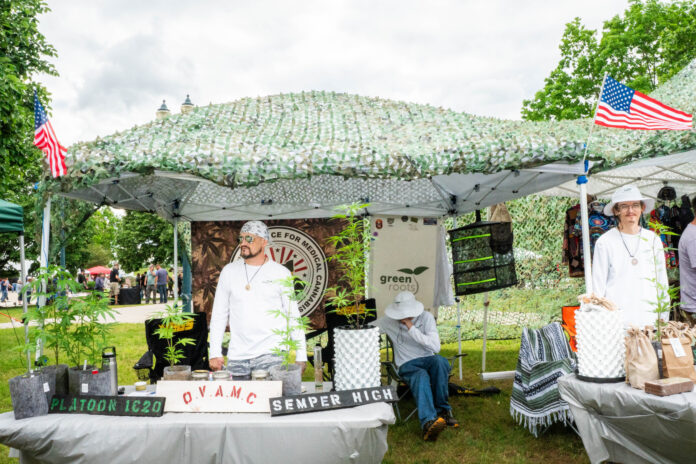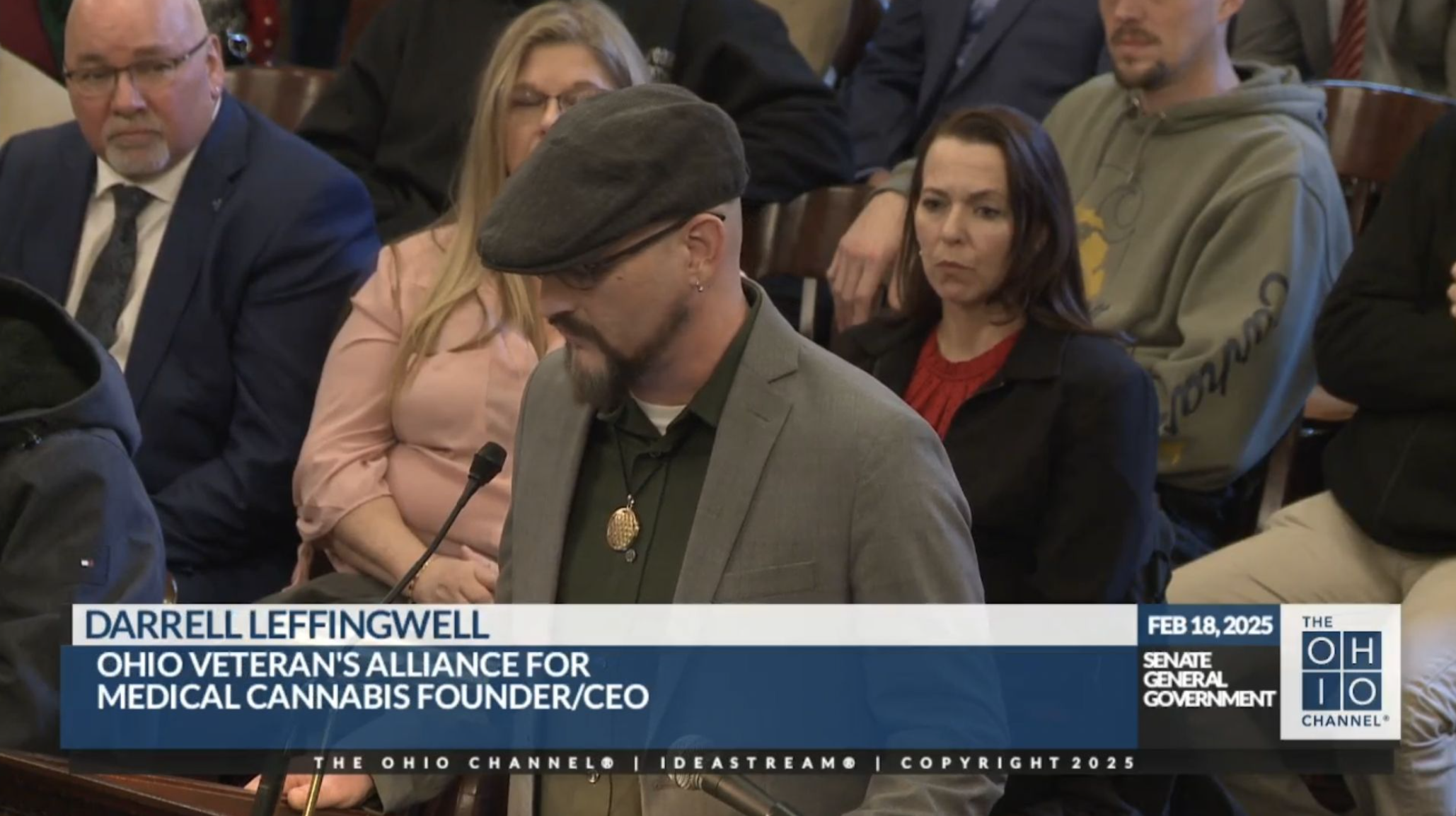Ohio Veteran’s Alliance for Medical Cannabis helps veterans heal chronic pain
November 11, 2025

SALEM, Ohio — When Darrell Leffingwell was discharged from the Marine Corps in 1994, he was taking 27 medications a day to manage his pain.
This is a reality many veterans face as they turn to complex medication regimens, often involving opioids, to manage chronic pain related to their military service.
“The medicines I was on were destroying me, killing me,” he said, which consisted of opioids like oxycodone.
In 2012, two million veterans in the care of the Veterans Health Administration were diagnosed with chronic pain disorder, and one-third of them were prescribed opioids, according to U.S. Department of Veterans Affairs data. This has led to high rates of overdose deaths among veterans.
Leffingwell knew he needed to find an alternative form of medicine to save himself. That’s why he started growing cannabis, and the benefits were immense.
Years later, he formed the Ohio Veteran’s Alliance for Medical Cannabis to keep his service brothers and sisters from suffering in silence. The non-profit organization advocates for and teaches veterans how to grow cannabis for pain management.
Today, it helps veterans across Ohio transition from using opioids and other medications to growing and cultivating cannabis — something Leffingwell calls “natural medicine.”
Third-generation cannabis grower
Originally from Lawrence County, Ohio, Leffingwell has been around cannabis his whole life. His family grew and sold cannabis before it was legal in the state.
“We grew it as part of our food, part of our culture, part of our way of life,” Leffingwell said.

But growing up in this environment took a toll on him; he didn’t want any part of the cannabis business and decided to enlist in the Marine Corps after graduating high school in 1991.
There, he trained to be an engineer and performed numerous tasks, including electrical work and operating heavy equipment.
Leffingwell was discharged from the Marine Corps in 1993 due to medical reasons that he says developed as part of the wear and tear of his service, including PTSD and various neurological issues. A few months later, he would permanently injure his back after going back to work.
To treat these medical conditions, Leffingwell was prescribed 27 medications a day by doctors from the U.S. Department of Veterans Affairs, which included opioids and antipsychotics. These drugs led him into a deep depression and were harming his liver, he said
“It destroyed my life, family life, any kind of life that I had,” Leffingwell said.
Veterans are often given opioids to treat chronic pain; this has led to high rates of overdose deaths over the years.
Between 2001 and 2009, overdose deaths from non-synthetic opioids doubled for roughly 30% of veterans who use Veterans Affairs services. Deaths continued to rise by 65% from 2010 to 2016, according to a study conducted in 2022.
Because of this, the VA has since lowered the amount of veterans prescribed opioids by 67% from 2012 to 2023.
But, at the time, Leffingwell knew he needed to find another way to manage his pain. That’s when his father’s friends suggested he try cannabis. At first, he detested the idea.
“I hated cannabis. I can understand people’s feelings about it because of the stigmas and the attachment to the illicit drug trade,” Leffingwell said, but he didn’t want to stay on opioids either. So, he started cultivating and researching cannabis in 1994, becoming a third-generation grower.
Ohio Veteran’s Alliance for Medical Cannabis
Leffingwell founded the Ohio Veteran’s Alliance for Medical Cannabis in March 2019, two months after medical marijuana started being sold legally in Ohio.
Through the non-profit, he began advocating for medical cannabis on Facebook, where he connected with veterans online. He would also attend medical marijuana events across Ohio and show up at the Ohio Statehouse, pushing for legislative reform.
It can be difficult for veterans to get access to cannabis, as it is still federally illegal and classified as a Schedule I drug, the same class as drugs like heroin, LSD and ecstasy. Because of this, VA health care providers cannot recommend or assist veterans in obtaining medical cannabis.
“That’s why I started the organization, to give veterans and their families a platform to feel like they can have a voice, and their rights are protected,” he said.
Today, the Ohio Veteran’s Alliance for Medical Cannabis acts as a middleman, connecting veterans with other organizations that supply them with the equipment to grow cannabis.
Additionally, 20% of sales from Leffingwell’s regenerative soil company, Green Roots, go to the organization to fund medical cannabis cards for veterans. Leffingwell founded Green Roots in 2023 with his sons to support the non-profit.

Healing veterans
Leffingwell spends much of his time at the Ohio Statehouse, continuing to advocate for law reform, and sets up a booth at various cannabis events in Ohio to connect with veterans.
That’s how Leffingwell met Mike England, a U.S. Air Force veteran who served from 1980-86. The two met at a cannabis event last fall, where England won a raffle and received free growing equipment.
Like Leffingwell, England suffers from chronic pain. He has two steel shoulders, rheumatoid arthritis, pinched nerves, degenerative bone disease, diabetes and skin cancer, which he says are a result of his time in the service.
“Every day is excruciating,” England said. To manage this pain, he was on a “lifetime subscription” of opioids like Vicodin and Tramadol in addition to “14 other pills I take every day just to stay alive,” he said.
After meeting Leffingwell, England began researching which cannabis strains to grow to manage his pain. He has also kept in touch with Leffingwell, who has provided support on his journey growing cannabis for the first time.
Cannabis improved England’s quality of life significantly: “I just took my grandchildren to Tennessee. We went to Dollywood, and I was able to push the 1-year-old in a stroller all day and do things I could not have done a few months ago,” England said.
On top of the medical benefits, Leffingwell and England say they benefit from the act of growing cannabis, too — something they call “soil therapy.”
“To be able to come out to the garden, peace and quiet, trim the plants and look at them: It’s a whole different world,” England said.
Challenges
Growing and advocating for cannabis hasn’t been without its challenges. For England, getting his 84-year-old mother on board took some convincing.
“When she found out this year that I was growing, I thought, ‘Oh, this is the end,’” he said, with a laugh. England understands where his mother’s concerns come from. She grew up in an era where marijuana was illegal, referred to as the devil’s lettuce and was often associated in the media with hard drugs like heroin.
But after some explaining, she has started to come around. “I do not smoke cannabis to get high,” England says. “The whole purpose behind this, for me, is to eliminate medication and the cost behind it, and to maybe get something that can alleviate the chronic pain long term.”
For Leffingwell, running a non-profit focused on cannabis advocacy hasn’t been easy either.
Currently, Ohio lawmakers are trying to pass legislation that establishes more penalties for cannabis users, like Senate Bill 56, something Leffingwell has been fighting against.
The state legalized marijuana recreationally in December 2023 through the voter-passed Issue 2 statute, and, since then, lawmakers have sought to tweak the rules it established.
The bill puts new restrictions on how much marijuana homegrowers can share and establishes stricter penalties for homegrowers who exceed the number of plants one is allowed to grow.
“They want to take the benefits, they want to take that healing away from (veterans), even by controlling the plant and the product. It should be readily available in people’s gardens and up to them if they want to grow it or smoke it or use it any way they want,” Leffingwell said.
“I don’t think it’s up to the government or somebody else to tell somebody what they can or cannot do with a plant.”

These challenges haven’t stopped Leffingwell, though: He’s seen the positive impact cannabis has had on veterans, and it’s just the beginning.
In states where medical cannabis is legal, roughly 41% of veterans who used cannabis in the span of a year used it for medical purposes, according to a VA study conducted in 2018. Veterans were also reported to use cannabis medicinally at double the rate of the general population.
While more veterans turn to cannabis, the VA continues to warn of cannabis’s side effects, stating there is a potential for “some individuals with (certain) conditions to derive therapeutic benefit from cannabis,” but that evidence regarding its health benefits is largely unavailable.
The agency warns of negative consequences, including psychosis, chronic bronchitis, lower life satisfaction and achievement and the psychiatric syndrome of cannabis use disorder.
Despite the skeptics, Leffingwell will continue to fight for a veteran’s right to heal through cannabis.
“Everybody loves a veteran; they want to help a veteran, but they don’t know how,” Leffingwell said. “What I’m doing, I’m doing it for the healing and to protect my veterans.”
For more information, visit www.facebook.com/OVAC.4.Change.
(Liz Partsch can be reached at epartsch@farmanddairy.com or 330-337-3419.)
Search
RECENT PRESS RELEASES
Related Post



